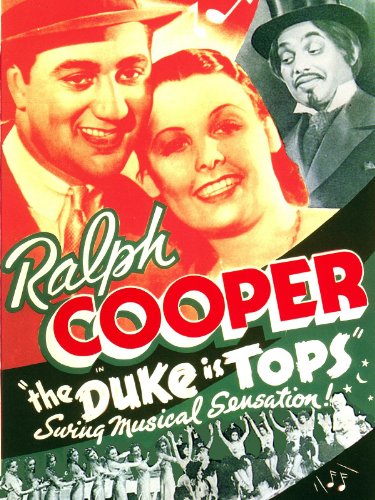It’s no secret that the Hollywood Comet loves musicals.
In 2010, I revealed I had seen 400 movie musicals over the course of eight years. Now that number is over 500. To celebrate and share this musical love, here is my weekly feature about musicals.
 This week’s musical:
This week’s musical:
The Duke Is Tops (1938) – Musical #599
Studio: Million Dollar Productions
Director: William L. Nolte
Starring: Ralph Cooper, Lena Horne, Laurence Criner, Neva Peoples, Monte Hawley, Vernon McCalla, Lillian Randolph (uncredited), Everett Brown (uncredited)
Themselves: Basin Street Boys, Cats and the Fiddle, Willie Covan
Plot:
Duke Davis (Cooper) is a talented performer but sets his own success aside to promote singer, Ethel Andrews (Horne). Ethel reaches success as the “Bronze Nightengale.” The problem is also that Duke is in love with Ethel, and their romance ends when Ethel goes to New York City for her career. As Ethel tries to succeed, Duke tries to make ends meet by traveling with a medicine show.
Trivia:
• Lena Horne’s first film appearance and it’s a rare film appearance where she gets to play a role rather than a specialty act.
• Lena Horne and other cast members weren’t paid for their work in “The Duke is Tops” because producer Ralph Cooper ran out of money, according to the book to Stormy Weather: The Life of Lena Horne by James Gavin
• The film was re-released in 1943 under the title “Bronze Venus.”
• The film premiered at in Pittsburgh at the Granada Theatre and was a benefit for the NAACP. Horne did not attend since she didn’t receive compensation for the film. Horne said later it was her husband, Louis Jordan Jones, that wouldn’t let her attend, according to Gavin’s book.
• The movie was shot in 10 deays, according to Stormy Weather: The Life of Lena Horne
by James Gavin

Ralph Cooper and Laurence Criner in “The Duke is the Tops”
Notable Songs:
• “I Know You Remember” performed by Lena Horne
• “Don’t Let Our Love Song Turn Me Blue” performed by Lena Horne
• “Killin’ Jive” performed by Cats and the Fiddle
• “Harlem Is Harmony” performed by Ralph Cooper and Swing Band Harlemania Orchestra
• “Thursday Evening Swing” performed by the Basin Street Boys
My review:
Though Lena Horne was in 15 films during the classic film era, in most of those, Horne was only a specialty performer. She would come on screen, knock out audiences with a fantastic performance of a song, and then wouldn’t be seen again. In very few of her films did she have an actual role.
However, her first film was an acting part. At age 20, Lena Horne had the lead role in “The Duke is Tops” (1938). The only problem is she wasn’t paid.

Ralph Cooper and Lena Horne in “The Duke is Tops”
“The Duke is Tops” (1938) is a B-musical that was released by Million Dollar Pictures, a production company that was co-created by one of the film’s leads, Ralph Cooper. “The Dukes is the Tops” would be considered a “race film,” as all of the performers are black.
Ralph Cooper, dubbed “The Dark Gable” after Clark Gable, was only in seven films. Along with co-creating Million Dollar Pictures, he acted, was a screenwriter, directed and choreographed dances in films. Outside of his film career, Cooper is probably better known as the founder of amateur night at the Apollo Theater in Harlem, New York City.
For a few years, I thought “The Duke is Tops” was a reference to composer and pianist Duke Ellington and his music. It’s not, the “Duke” reference is to Ralph Cooper’s character who is named Duke.
The storyline of “The Duke is Tops” focuses more on Ralph Cooper. Cooper and Lena Horne are sweethearts, but he breaks it off with her in a “tough love” way so that she will go to New York City to try and continue her career. While Cooper believes that Horne is off being a great success, he tries to make ends meet while working in a medicine show. In the end, they realize that neither is successful without the other.
Lena Horne sings beautifully in the film, though she hasn’t yet developed the technique and signature style that we later saw throughout her career.
At one point, a producer trying to cast Lena Horne in a film says, “That girl’s a specialty, not a star.”
Unfortunately, it’s like these characters predicted Horne’s film future. Other than “Cabin in the Sky” (1943) and “Stormy Weather” (1943), all of Horne’s film roles after “The Duke is the Tops” from 1942 to 1956 were specialty walk-on singing parts. After “The Duke is the Tops,” Horne’s next film wasn’t until “Panama Hattie” (1942) when she come son to sing one song, “It Was Just One of Those Things.”
Outside of the two stars, “The Duke is Tops” has some great performances from Basin Street Boys and the Cats and the Fiddle.
This musical may be of a B or C budget, but I feel like the quality and the performances are pretty good, especially in comparison to Oscar Micheaux’s “Swing!” which was released the same year. “The Duke is the Tops” also doesn’t seem to have stereotypes like “Swing!” did.
“The Duke is Tops” is notable, because it was Lena Horne’s first time on screen, but also makes me sad knowing that she rarely had the opportunity to have a lead role during the studio system.
Check out the Comet Over Hollywood Facebook page, follow on Twitter at @HollywoodComet or e-mail at cometoverhollywood@gmail.com
